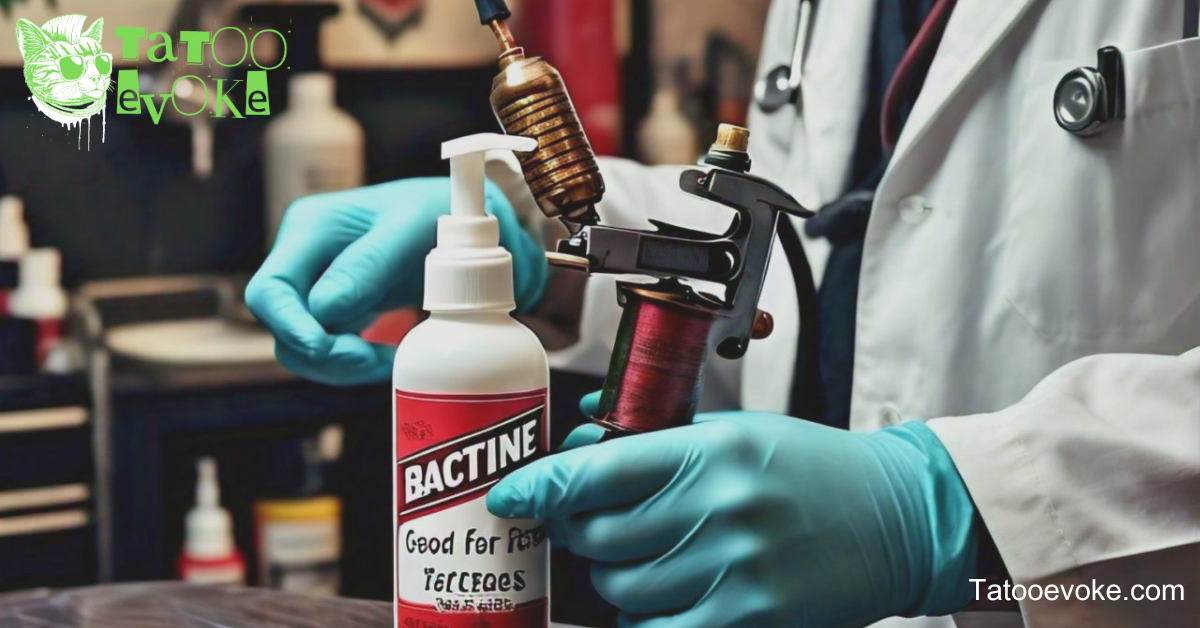1 Introduction
Tattoos are a way to show yourself that has been brought down through generations and countries. They need careful aftercare to make sure they heal properly and keep their original colour. It’s essential to take good care for your tattoo after getting it done in order to avoid diseases, lessen infections, and preserve the color and detail. Bactine is a common topic of discussion when individuals discuss after-care for tattoos. This piece looks at whether “is Bactine good for tattoos” by examining the pros and cons and views of artists and experts.
2 Bactine and Its Uses

Understanding Bactine
Bactine is a common medication that has been used for many years. It initially served to keep small scrapes, cuts, and burns from getting affected. Now, many people use it as their go-to tool for treating minor wounds. Bactine is useful, but what exactly is it and how does it work?
Bactine’s Active Ingredients
Bactine’s main active components are a mixture of benzalkonium chloride and lidocaine. For example, benzoyl chloride is an antibiotic that kills bacteria and stops ailments from happening, and lidocaine eliminates pain. All of these chemicals make Bactine a good choice for recovery minor skin wounds and irritations.
Bacteria are killed by benzoalkonium chloride because it harms their walls of cells. This stops illness from happening. Lidocaine calms the skin right away, which makes it a great ingredient for dealing with the pain and burning associated with small wounds.
Common Uses of Bactine
Bactine has been used for many years to clean up small cuts and scratches, calm bug bites, and relaxed the pain and irritation of small skin reactions. Its antibacterial abilities keep cuts free of bacteria that can make them more serious, which helps them recover faster. Bactine has these qualities, and that’s why some people think about using it for tattoo treatment.
Bactine additionally serves as first aid for small cuts and burns because it guards against germs and dulls pain thanks to the lidocaine it contains. Its position as a useful and reliable home remedy is partly based on how effectively it treats small skin issues.
3.Tattoo Aftercare Essentials
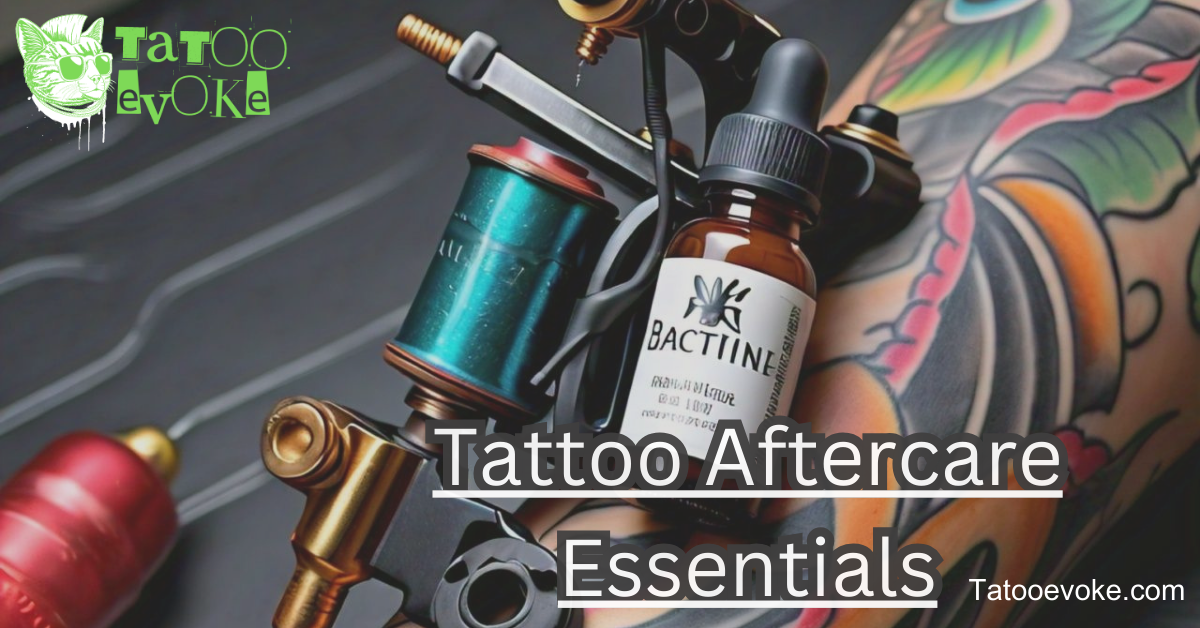
Importance of Proper Tattoo Care
It’s important that you take proper treatment of a new tattoo so it grows well and looks great for a while to come. Taking care of your tattoo carefully after getting it done helps maintain the colour and transparency up and stops diseases. Not taking proper care of a tattoo can cause problems like infections, too much peeling off, and fading.
The most significant period is right after getting a tattoo, for a couple of days. The skin is basically a wound that’s open and how you’re taking care of it during this time will have significant impacts on how the tattoo looks ultimately. It is essential to keep the tattoo clean, wet, and away from things that could hurt it while it heals.
Common Products Aftercare
Tattoo aftercare products are widely available, ranging from specialty lotions and ointments to everyday items like petroleum jelly and antimicrobial potions. These items are meant to keep the skin wet, stop infections, and hurry up the repairing process. Knowing the good and bad points of every good can help you identify the best way to take care of your tattoo after obtaining it done.
Tattoo treatment items are often made with chemicals that keep the skin wet and protect it. For example, Aquaphor and Tattoo Goo are popular because they keep moisture in and help the flesh heal. On the other hand, easier options like petroleum jelly are praised for being able to protect, but they might not moisturise additionally.
4.Is Bactine Good for Tattoos?
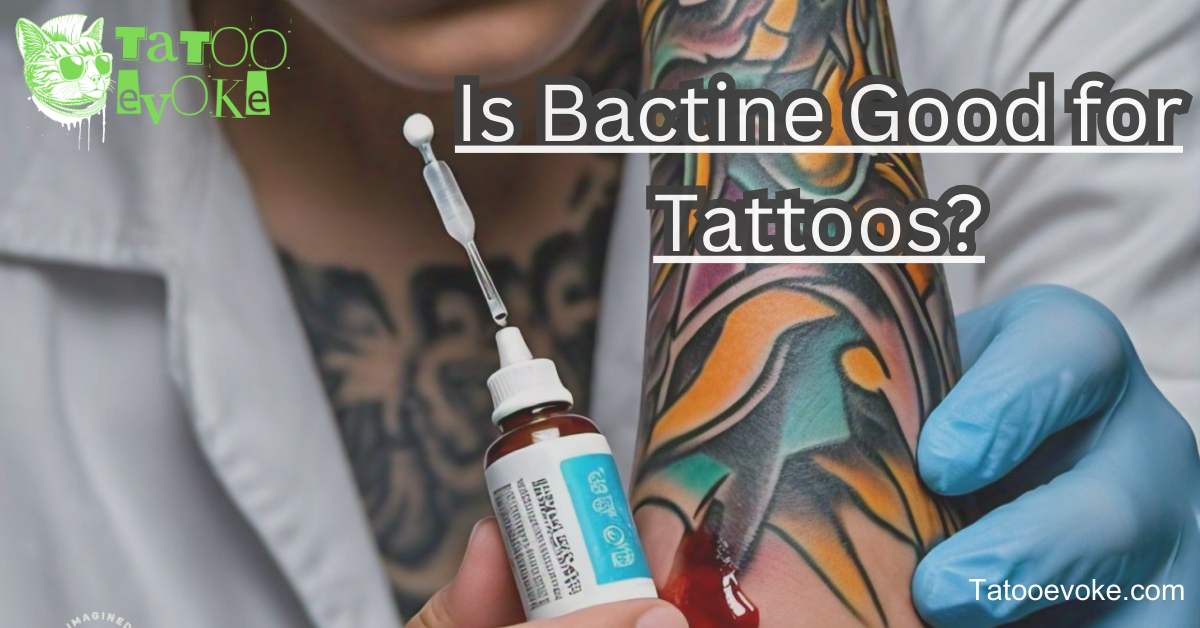
Pros of Using Bactine on Tattoos
Bactine can be used on tattoos to get a range of benefits. It keeps dangerous microorganisms away from the tattoo, lowering the possibility of infection. The lidocaine included in toothpaste can also be used to relieve pain; this is especially useful if the skin is still hurting a few days after getting a tattoo.
Because it prevents infections, benzalkonium chloride is necessary to maintain the tattooed area clean in the first few days following a tattoo, when the danger of illnesses is highest. Lidocaine can also make the treatment process easier because it reduces pain. This is especially true for people who are really unhappy with their new tattoos.
Cons of Using Bactine on Tattoos
When applying Bactine on tattoos, there are a few potential problems. The application of alcohol-containing items may cause irritation and damage freshly inked skin, according to a number of tattoo makers and medical professionals. An antibiotic found in bacteria called benzalkonium chloride is effective, but excessive usage of it might cause dehydration.
If Bactine helps you a lot with pain, it might also keep your body from telling you important things. Even though drugs like Bactine can ease the pain of a tattoo, you should see a professional right away if the pain gets unbearably bad or if the tattoo shows signs of an infection, like more swelling, redness, or discharge.
Comparing Bactine to Other Aftercare Products
Like other tattoo treatments, Bactine has advantages and disadvantages. Tattoo ointments and lotions are often designed to moisturize and protect the skin, as opposed to drying it out like goods with alcohol in them. However, since it reduces discomfort, some individuals may find that benzine is more calming.
When it relates to tattoo care products, Aquaphor is commonly used because it keeps hydration in the skin and forms a shield around the tattoo. This can help keep the skin wet and help it recover faster. Similarly, Tattoo Goo and Hustle Butter are made to care for tattoos after the work has been done. They give the skin the water and vitamins it needs to heal without drying it out.
5.How to Use Bactine on Tattoos
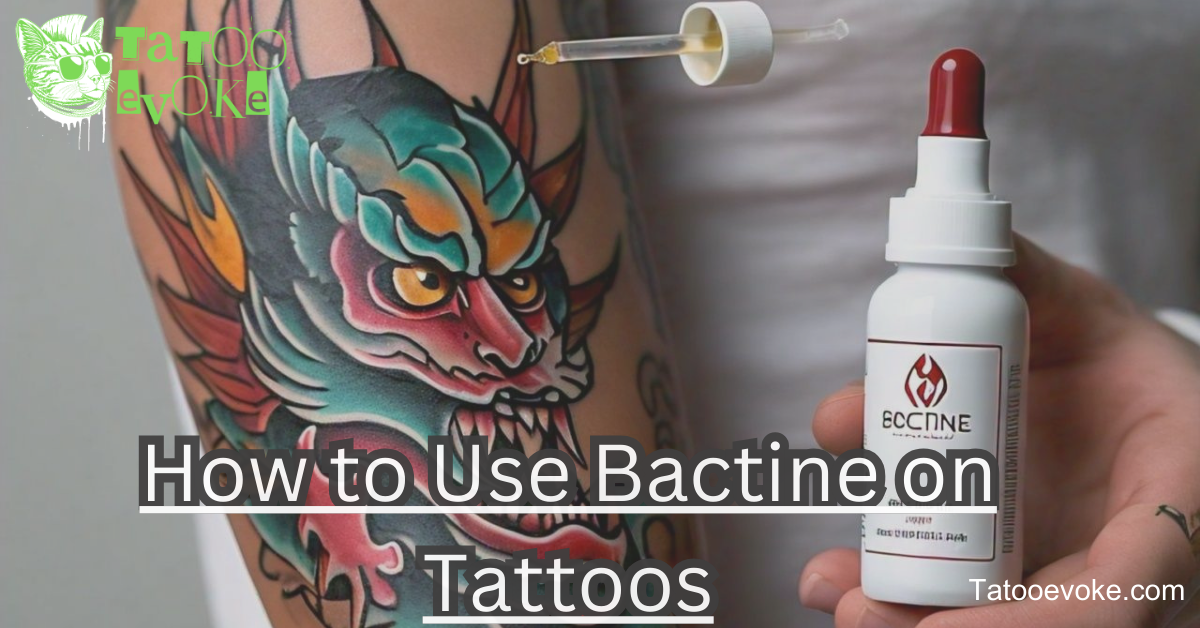
Correct Methods of Application
If you decide to use Bactine on your tattoo, make sure you do it the right way. To keep germs from getting on the tattoo, wash your hands well first.If you decide to put benzine on your tattoo, it is crucial that you apply it correctly. Wash your hands well before touching the tattoo to prevent germs from getting into it. Spray a small mist of Bactine over the tattoo, to ensure it covers the whole area. Don’t wet the tattoo too much, because too much water can make it take longer to recover.
If you use Bactine, pause for it to dry naturally before using another treatment products, like a lotion or ointment that helps to keep your skin moist. This helps make sure that Bactine’s germ-killing attributes have moments to work well.
Frequency of Use
It’s essential to use Bactine with care. It’s usually best to use it no more than two or three times a day. Overuse can make the skin dry and irritated, which can make the repair process harder. To keep your face healthy, it’s important to use Bactine along with other hygiene methods.
Dos and Don’ts
Do: Clean the tattoo with a gentle soap that doesn’t have fragrance before putting Bactine on it. This helps eliminate of any dirt or bacteria that might be on the skin so that Bactine can work correctly.
Do: Use Bactine as an additional item instead of as your main way of aftercare. Bactine can help with healing wounds and pain, but it’s essential as well to use skincare products that keep the skin fresh.
Don’t: use Bactine on skin that has cracked or flaking a lot. It is not recommended to use medications on wounds or irritations that are very harmful as they can make the infection more serious.
Don’t: Only use Bactine for aftercare; constantly comply with your tattoo artist’s cleanup instructions. Every tattoo and skin type is distinct, so your artist will give you guidance that is specific to your needs.
6.Expert Opinions on Bactine for Tattoos
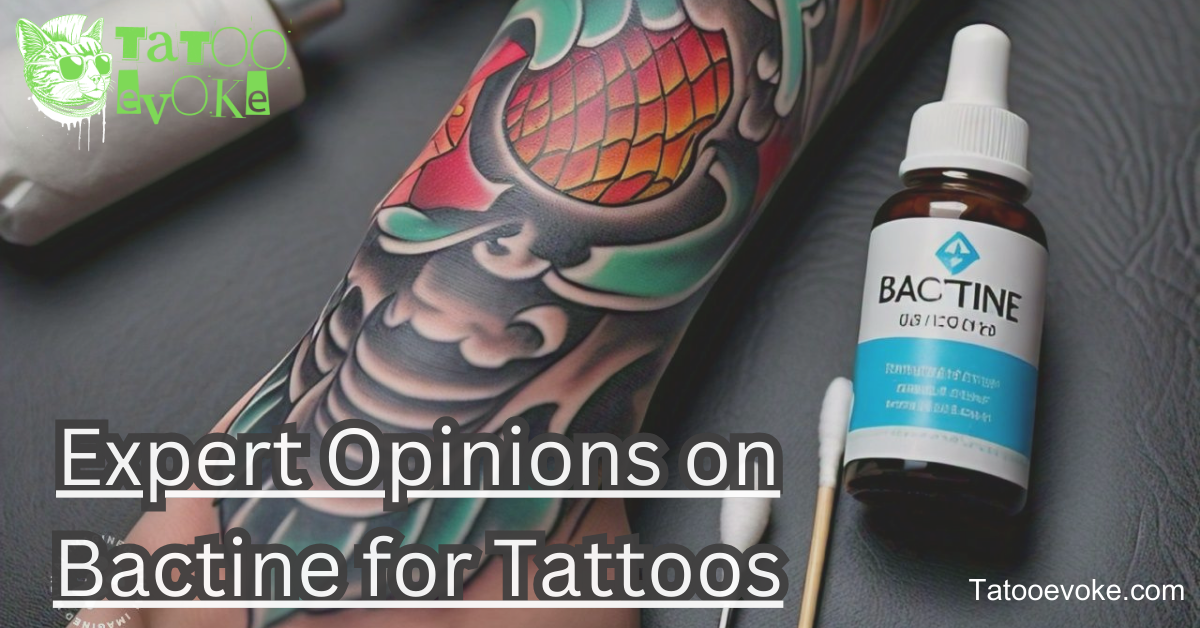
Tattoo Artists’ Perspectives
Many of tattoo artists have different a view about using Bactine to take care of tattoos after they are done. Although some people like that it’s clean and reduces pain, others warn that it might not give tattoos the wetness they need to heal. Many experts agree that it should only be used sometimes and with other, hydrating treatment products.
Some tattoo artists say that Bactine is good because it keeps the tattoo clean and reduces pain, especially in the first few days after getting one. But they also say that using a good lotion is important to keep the skin wet and stop it from flaking off too much.
Dermatologists’ Views
Dermatologists also have different thoughts on using Bactine for tattoos. Some people say it should be used because it kills germs, especially if you are worried about getting an infection. They also stress how important it is to balance its use with products that keep the face properly hydrated.
Dermatologists often stress how important it is to have a well-balanced cleaning practice that includes both antiseptic protection and drinking enough water. They might say to use Bactine because it kills germs, but they would also suggest using a lotion with it to keep the skin from getting too dry.
7.Real-Life Experiences
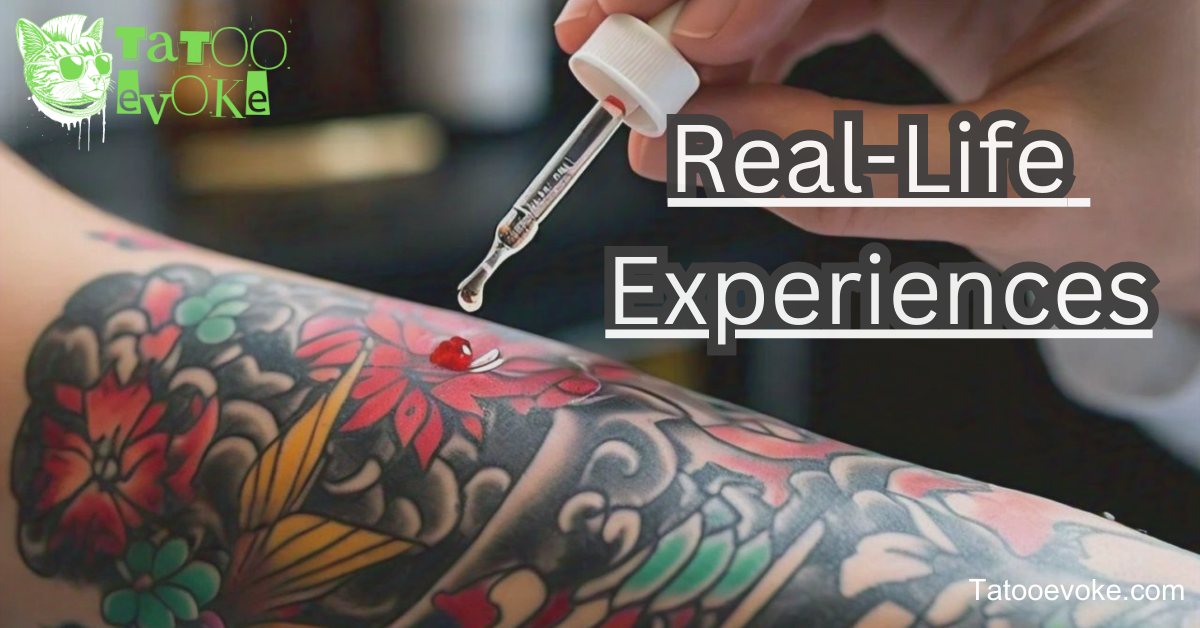
Testimonials from Tattoo Enthusiasts
People who have tattoos often talk about their own experiences with treatment products like Bactine. A lot of people say the results were good, especially when it comes to pain relief and avoiding infections. Others, though, say it makes their skin dry and suggest using it with a good lotion.
For instance, some people have found that Bactine reduces the burning feeling that comes with getting a new tattoo, which makes the treatment process more enjoyable. Others, though, have said that using Bactine alone made their complexions dry and dry, so they recommend using it with a relaxing cream or balm.
Case Studies
Several case studies show how well Bactine works in specific situations. For example, people with big wounds that tend to get upset might find the pain relief helpful. On the other hand, people with sensitive skin may have better results with regular treatment products that are meant to keep the skin fresh.
In one case study, a person with a big back piece said that Bactine helped their pain a lot, which made it easier for them to sleep in the days after getting the tattoo. But they also said it was important to use a moisturizer to keep the skin from getting dry and make sure the tattoo recovered properly.
8.Alternatives to Bactine for Tattoo Care

Traditional Aftercare Methods
Traditional tattoo treatment involves applying things like petroleum jelly and antibiotic lotions and creams For a quicker recovery, these methods focus on keeping your tattoo clean and wet. Their efficiency and ease of use keep them popular, though they are simple.
For example, petroleum jelly fills the part of the tattoo with a layer that keeps moisture in and keeps out outside factors that might irritation the skin. On the other hand, antibiotic lotions keep moisture and kill bacteria, which makes them an excellent option for tattoo treatment.
Modern Aftercare Products
Several specific aftercare items have been made for the tattoo business. Ointments, lotions, and creams that are made to help the healing process are some examples. Products like Aquaphor, Tattoo Goo, and Hustle Butter are made to keep the skin moisturized and shielded without dehydrating it out like antiseptics like Bactine might.
Aquaphor is a popular choice among tattoo artists and fans alike because it moisturizes well and shields the tattoo. Tattoo Goo, which is made from organic substances like wax and olive oil, keeps the skin soft and gives it nutrition that help it repair. Other highly suggested product, Hustle Butter, is made with shea butter and mango butter, which moisturize and protect the skin without closing pores.
9.Potential Risks and Precautions
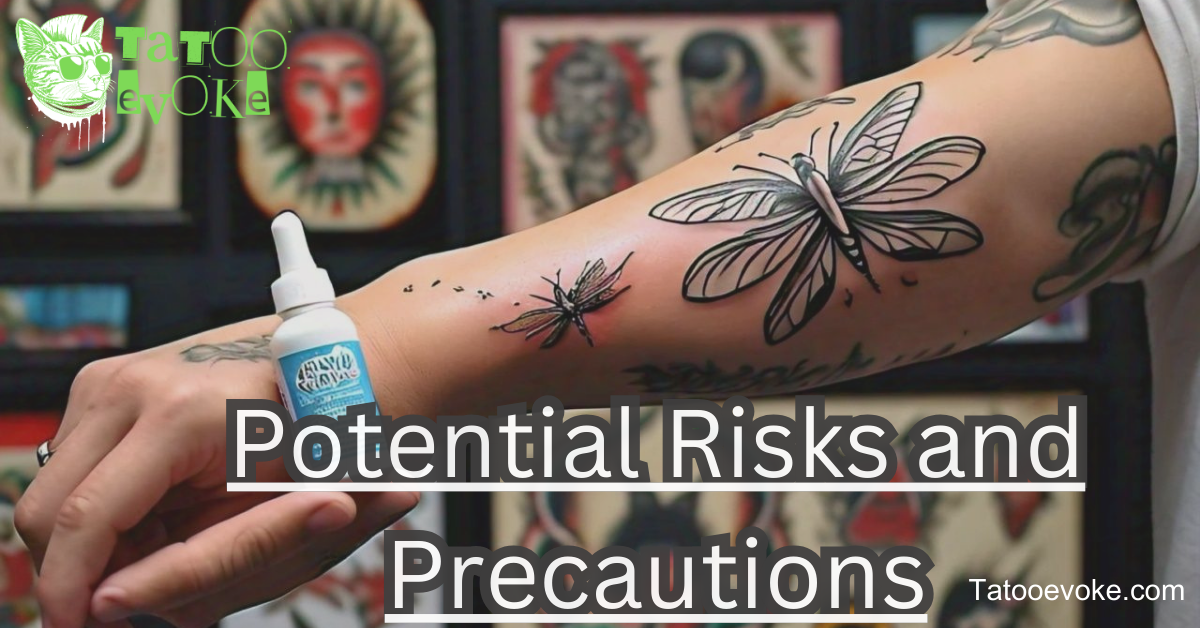
Allergic Reactions
Similar to any other medication, using Bactine on tattoos involves the risk of allergic reactions. Symptoms might involve itching, redness, and swelling. It’s important to try the medication on a tiny area of skin first, instead of using on whole tattoo.
If you detect symptoms of an allergic reaction, like greater levels of redness, itching, or swelling, avoid it right away and talk to a medical professional. Treating any allergic reaction immediately is important to avoid additional issues.
Overuse and Misuse
To significantly Bactine can cause dryness and irritation, which can slow down the repairing process. By using it as advised and combining it with relaxing products, you may maintain your skin healthy.
Spraying Bactine more often than advised can dry out the skin by eliminating its own oils, which could slow down the repairing process. Try to using Bactine no more than twice or three times a day, and make sure you use a lotion too to keep your skin from dehydrating out.
10.Conclusion
Finally, Bactine can be a helpful part of your tattoo treatment process because it assists with irritation and germs. It must be used rarely, though, and with other hydrating items to make sure the best repair. To get the best outcomes from your new tattoo, it’s essential to follow your tattoo artist’s guidelines and watch how your skin acts to any treatment items.
Aftercare over your tattoo is essential if you want it to recover properly and keep its color. Bactine provides several benefits, such as avoiding infections and treating pain, but it’s important to use it with products that keep the skin hydrated. If you take care of your tattoo the right manner and talk to an expert when you need to, you may achieve a beautiful tattoo that takes for years.
For more information on tattoos and related care, you can read our posts on
